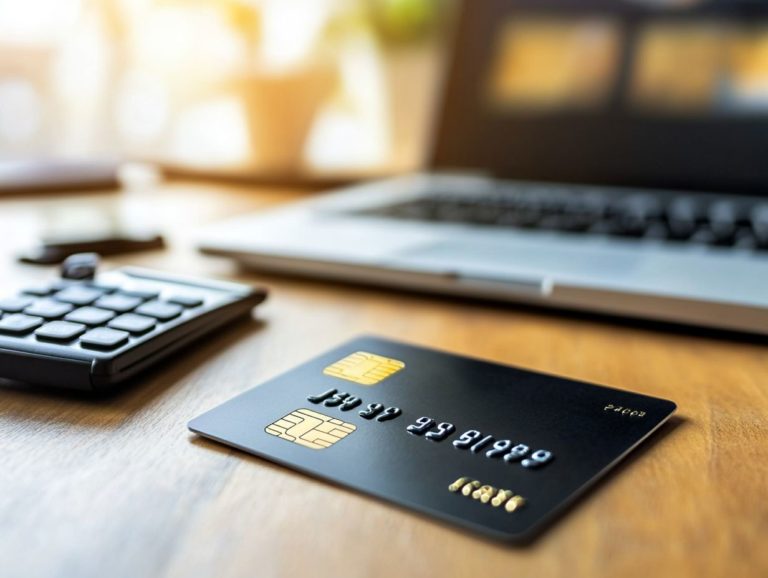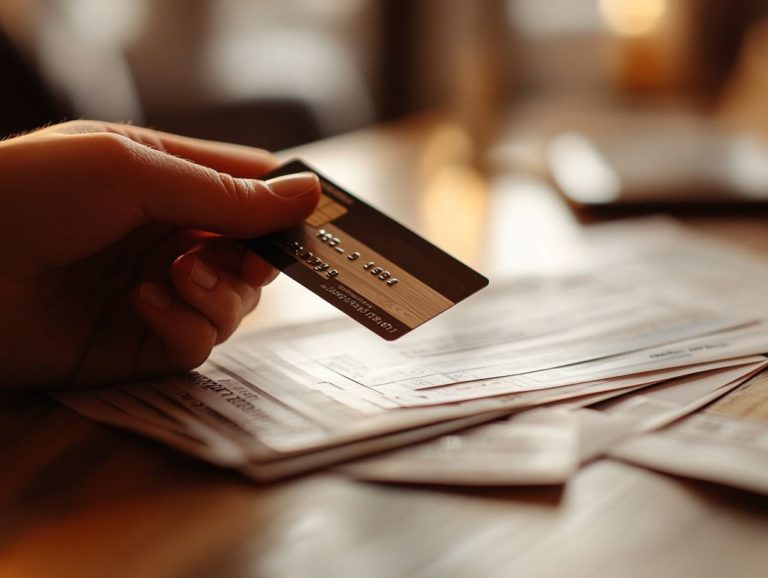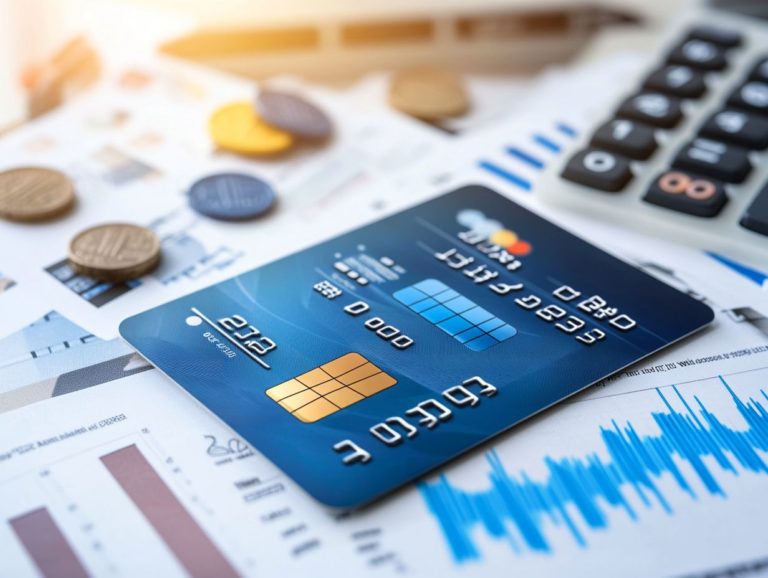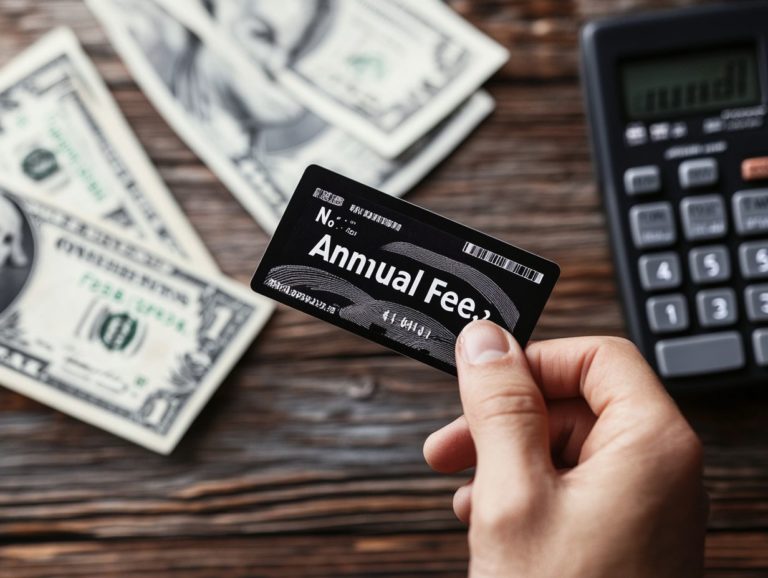What Are the Risks of Credit Cards?
Credit cards are a powerful financial tool. They offer convenience and attractive rewards that many find appealing.
However, they also come with potential drawbacks, including high interest rates and the risk of overspending. It s crucial to understand both the advantages and risks to make well-informed decisions regarding credit card usage.
This article delves into the intricacies of credit cards, offering insights into responsible usage and exploring alternatives that may better align with your financial needs.
Contents
Key Takeaways:
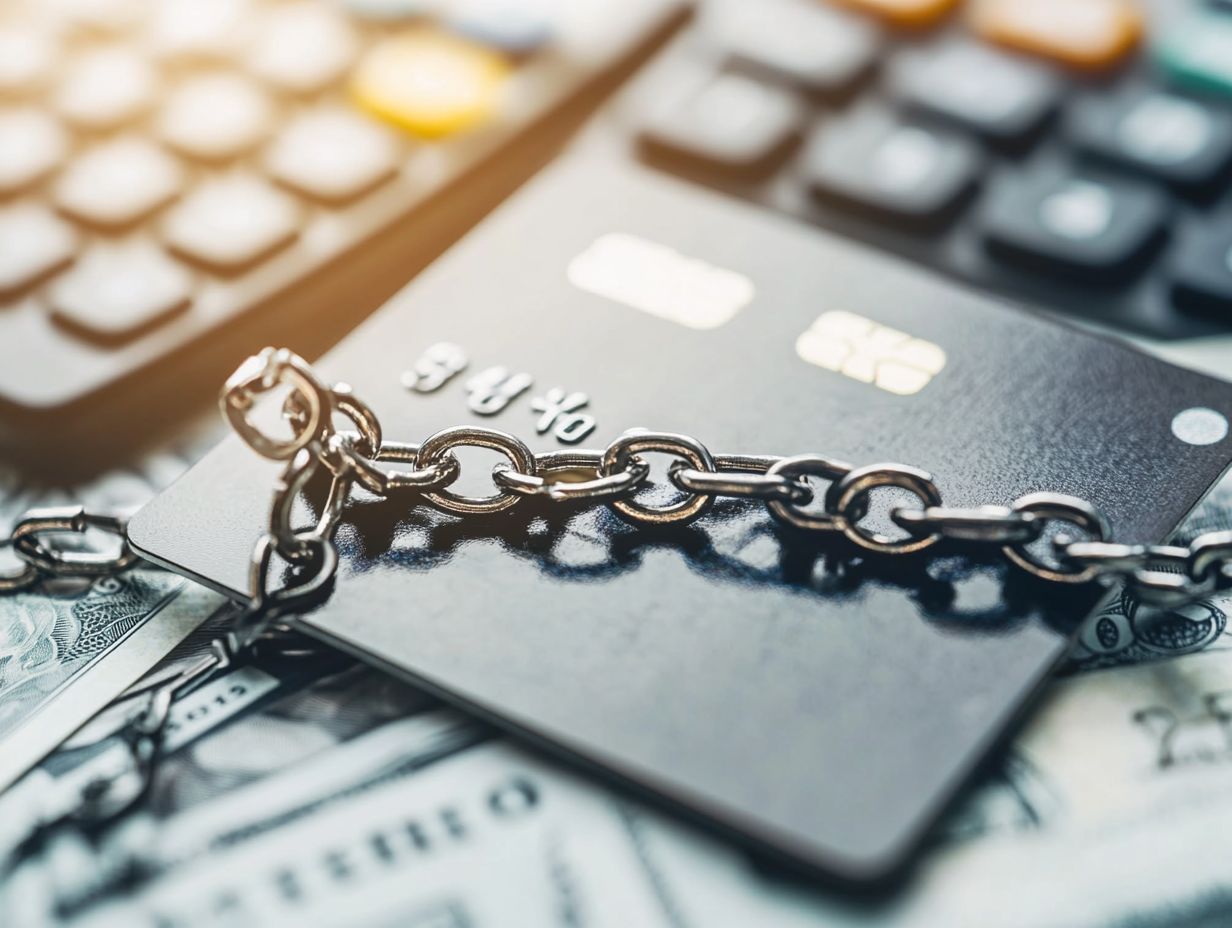
Understanding Credit Cards
Grasping the intricacies of credit cards is essential for making informed financial choices. It helps in managing your financial health effectively.
A credit card, essentially a sleek piece of plastic issued by a bank or credit union, allows you to borrow funds to make purchases at any merchant that accepts cards. As the cardholder, you are expected to repay the borrowed amount typically with interest within a designated billing cycle.
Credit cards do more than just make shopping easy. They help you build your credit history and enhance your credit score, both of which are vital for unlocking future financial opportunities.
Definition and Basic Function
Credit cards serve as powerful financial tools, offering you a line of credit that you can utilize for purchases, with the expectation that you’ll repay the borrowed amount within a designated monthly billing cycle.
Each credit card typically comes with a credit limit, which is the maximum amount you can borrow without incurring penalties. Making timely payments positively influences your credit score, showcasing your responsible financial behavior. However, missing payments or exceeding your credit limit can result in substantial fees and tarnish your credit history.
It s crucial to remain mindful of interest rates, as carrying a balance can lead to accumulating debt, ultimately impacting your financial well-being over time. By grasping these fundamentals, you can make more informed and strategic decisions regarding your credit usage.
Benefits of Credit Cards
Credit cards present a wealth of benefits that make them a favored payment choice for discerning consumers like you. From enticing cash back rewards to exclusive travel perks, they offer both convenience and significant financial advantages that can enhance your lifestyle.
Rewards and Convenience
One of the primary attractions of credit cards lies in their ability to earn rewards on purchases, significantly boosting your financial well-being by incentivizing smart shopping.
These reward programs come in various forms, such as cash back or travel deals, designed to cater to your unique spending habits and preferences. For example, cash back rewards can help reduce your monthly expenses, allowing you to direct those savings toward other financial goals. Travel rewards can turn your dream vacations into reality by accumulating points that lead to complimentary flights or hotel stays.
By utilizing these rewards effectively, you not only simplify budgeting but also enhance your ability to track monthly expenses. This encourages mindful spending and fosters financial discipline, ultimately contributing to a more secure financial future.
Potential Risks of Credit Cards
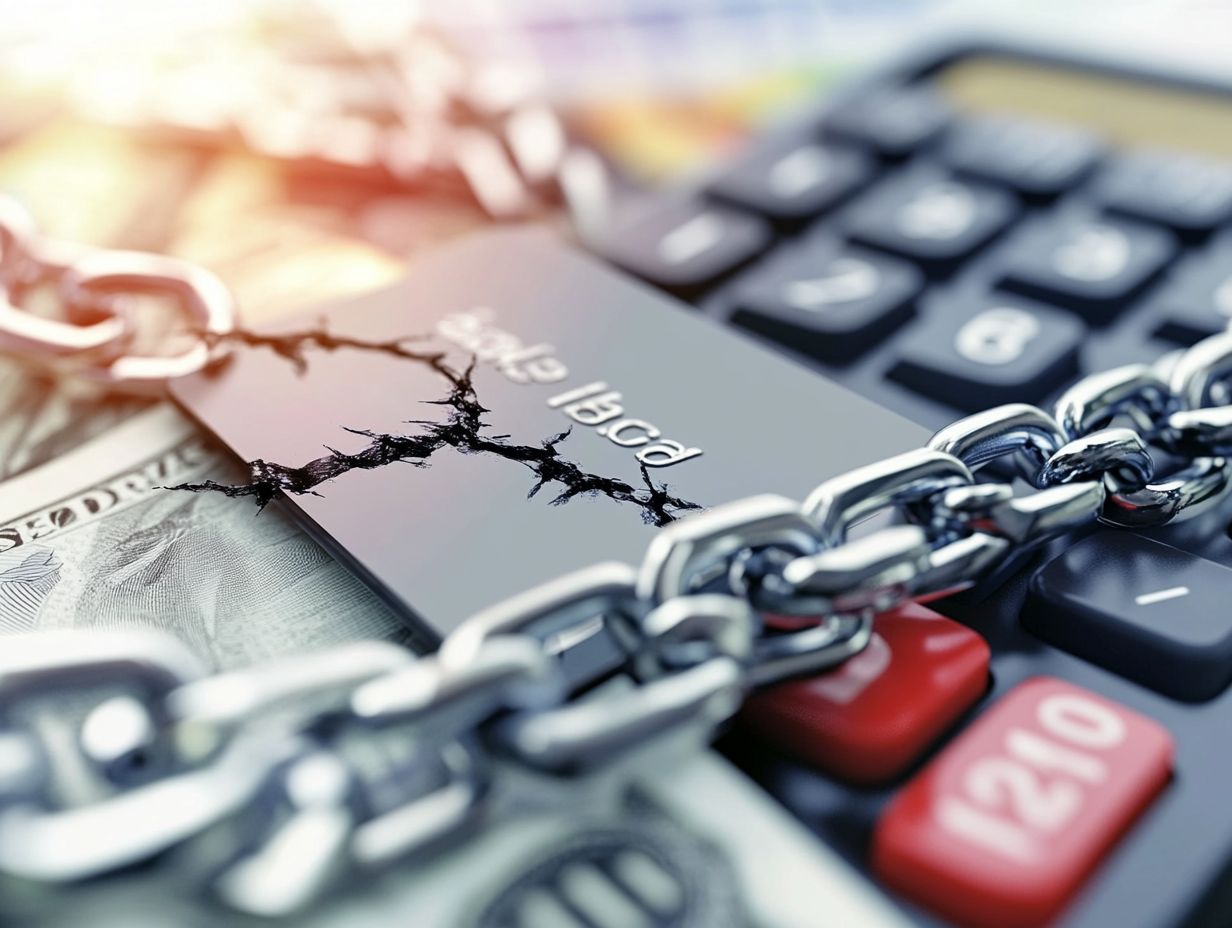
While credit cards offer numerous benefits, they also carry potential risks that can result in financial strain if not handled with care. Understanding these risks is crucial. Ignoring them can lead to serious financial trouble.
High Interest Rates
Credit cards often come with high interest rates, typically represented as an Annual Percentage Rate (APR). If balances aren t paid in full, those rates can rapidly escalate your credit card debt.
When you find yourself making only minimum payments, the compounding nature of a high APR can create a snowball effect. This makes it increasingly difficult to regain your financial footing. It s essential for you to understand how these rates work, as this knowledge gives you the power to devise more effective payment strategies.
By prioritizing payments on high-interest accounts, you can mitigate the impact of accumulating charges and reduce your overall debt burden. Keep an eye on interest rate fluctuations to make informed decisions about when to use credit or consolidate your debt.
Overspending and Debt
Overspending can trap you in a cycle that s hard to break. The ease of swiping a card can easily lead to increased credit utilization and the accumulation of debt if not meticulously monitored.
This can raise your credit utilization and potentially jeopardize your credit score. To break free from this cycle, it’s essential to adopt effective budget-tracking strategies.
Using mobile apps or spreadsheets to categorize your expenses grants you a clearer view of your spending habits.
Setting up alerts when you’re nearing your credit limit or establishing a monthly spending cap can also help you avoid unintentional overspending. By maintaining a keen awareness of your credit usage and overall financial situation, you can make informed decisions that lead to healthier financial habits.
Fraud and Identity Theft
Fraud and identity theft are pressing concerns for credit card users. It s essential to grasp the fraud protection measures your issuer provides to safeguard against unauthorized charges.
These risks can come from various sources. Phishing scams, data breaches, and lost or stolen cards are common.
As a credit card holder, you should remain vigilant in monitoring your statements for any unusual transactions. Promptly report any suspicious activity to your card provider.
Many issuers equip you with advanced technology, such as real-time alerts and zero liability policies. These policies mean you won’t pay for unauthorized charges. By staying informed about the latest security features and using them to your advantage, you can diminish your vulnerability to fraud and identity theft.
This ultimately paves the way for a safer financial experience.
Managing Credit Card Risks
Managing credit card risks requires you to adopt strategies for responsible use. These are crucial for safeguarding your financial health and steering clear of potential debt traps.
Tips for Responsible Credit Card Use
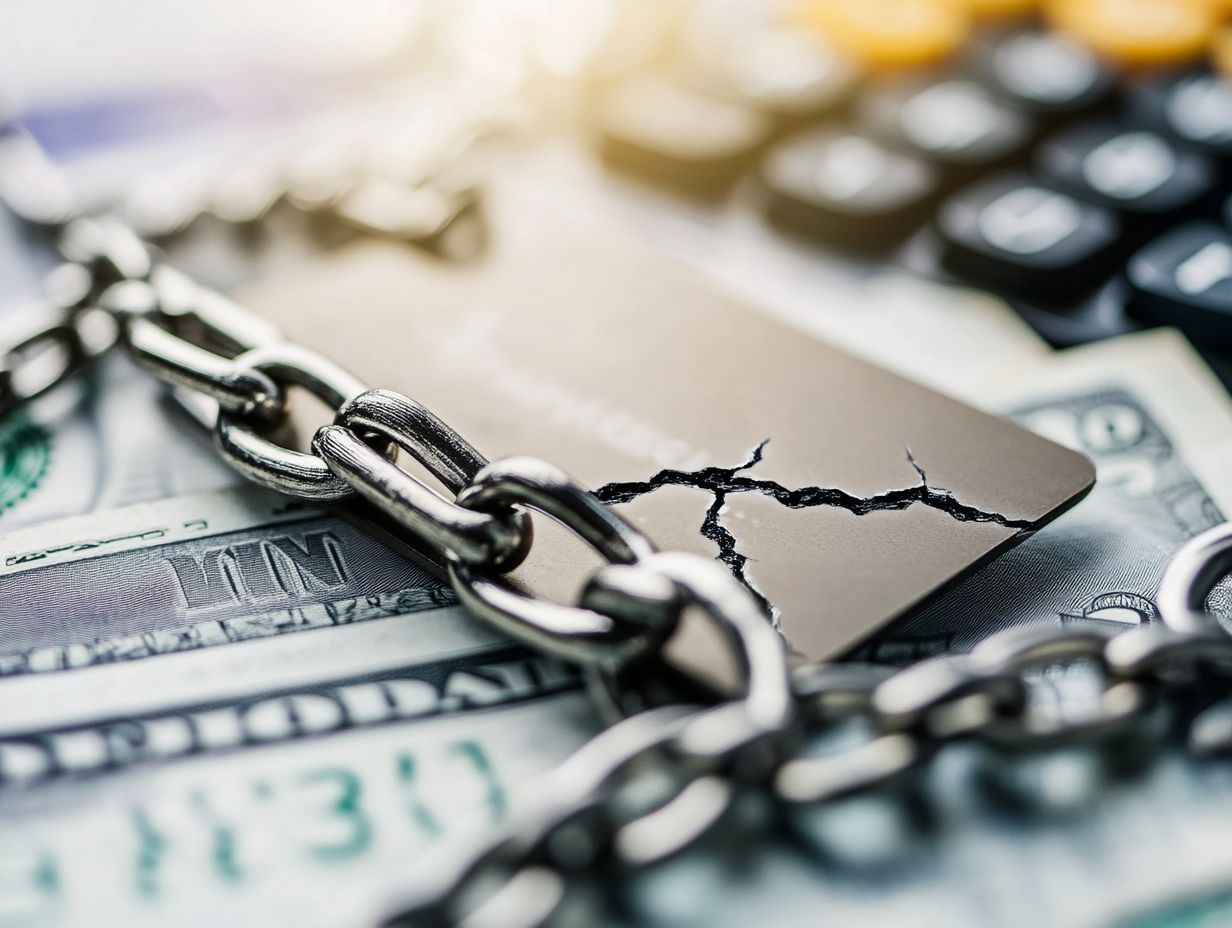
To maintain good financial health, you must adopt responsible credit card practices. This includes monitoring your payment history and effectively managing how much credit you re using compared to your limit.
By keeping an eye on your credit utilization ratio ideally keeping it under 30% you can avoid excessive debt and enhance your creditworthiness. Being aware of how trustworthy you are to lenders can be beneficial.
Tracking your monthly expenses using budgeting apps or spreadsheets gives you a clear overview of your spending habits. It also helps you pinpoint areas where you can save.
Consistently making payments on time is essential. It reinforces a positive payment history, which is crucial for shaping your credit score.
By integrating these habits into your daily routine, you can cultivate a more stable financial future while fully enjoying the benefits that credit cards provide.
Alternatives to Credit Cards
While credit cards present a range of enticing benefits, there are alternatives better suited for your needs. Consider these options if you’re looking to steer clear of debt and manage your finances with precision.
Other Payment Options
Other payment options, such as debit cards and personal loans, provide viable alternatives to credit cards. They often come with fewer risks related to debt.
For instance, using a debit card allows you to spend only what s in your bank account. This significantly reduces the likelihood of falling into debt, unlike credit cards, which can tempt you to overspend. On the flip side, personal loans can be advantageous for larger expenses. They offer fixed payment plans and typically feature lower interest rates compared to credit cards.
Both alternatives have their own considerations. Debit cards don t help you build credit. Additionally, personal loans might come with fees and require a credit check, which can limit access for some. Evaluating these options means aligning them with your personal financial goals while weighing their respective pros and cons.
Frequently Asked Questions
What Are the Risks of Credit Cards?
Credit cards come with certain risks that can affect your financial stability if not used responsibly. These risks include:
Are Credit Cards Secure to Use?
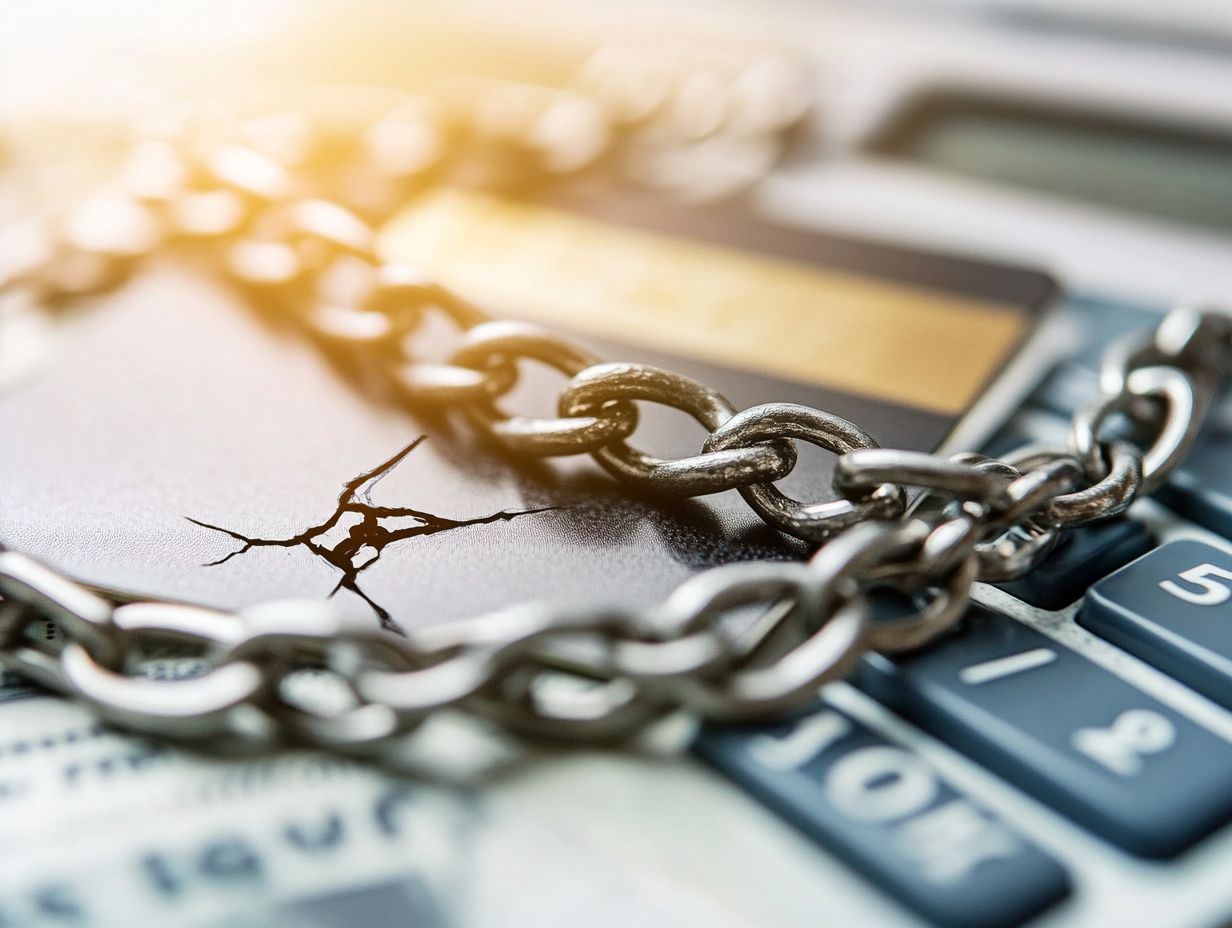
Let s be clear: using credit cards has some risks you need to know about. In general, credit cards are secure as long as you follow proper safety measures.
What is the Risk of Overspending with Credit Cards?
One of the biggest risks of credit cards is overspending. With the convenience of swiping a card, it’s easy to lose track of your spending. This can lead to a large credit card balance that you cannot pay off in full.
How Can Credit Card Fraud Affect Me?
Credit card fraud is a serious risk that can have a significant impact on your finances. If someone steals your credit card or obtains your information, they can make unauthorized purchases and leave you with a large bill to pay.
What Happens If I Miss a Credit Card Payment?
Don t miss a credit card payment! It can lead to late fees, increased interest rates, and a negative impact on your credit score. If you continue to miss payments, your credit card company may even take legal action against you.
Is It Possible to Become a Victim of Identity Theft with Credit Cards?
Yes, unfortunately, credit cards can make you vulnerable to identity theft. If someone obtains your personal information, they can use it to open credit card accounts in your name and rack up debt that you are responsible for.

